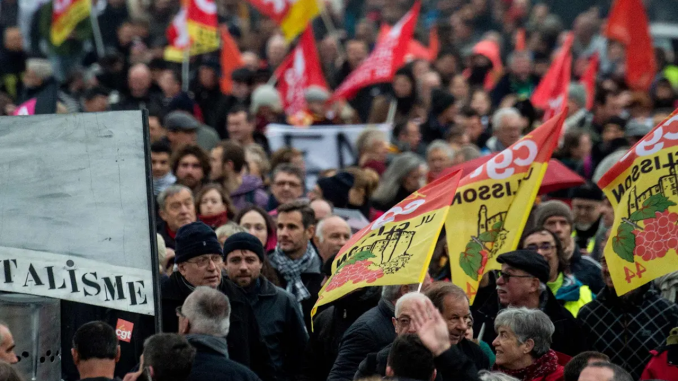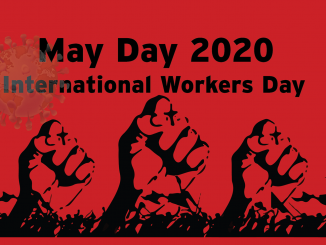
Many thousands of workers and students have taken to the streets of France once again in response to the government’s announcement on March 16 that it is raising the retirement age from 62 to 64. President Emmanuel Macron and Prime Minister Elisabeth Borne have done this without a vote of the National Assembly. Macron’s government has been threatening to do this, to keep workers on the job two additional years before they can claim their retirement funds. But knowing that he might lose the vote in the National Assembly, Macron used Article 49.3 of the French Constitution, which allows the President’s government to impose a new law without a vote in the National Assembly.
The imposition of the pension reform by Macron has caused an explosion of fury across France. The anger and shock at this move by Macron is huge. Even the heads of the unions have called for big demonstrations on Thursday, March 23. But why are they waiting until then? Will they ask to bargain? What is there left to bargain over? Macron has launched a challenge — and now a fight to the end is necessary.
Workers and students have been striking and demonstrating over the last year or so, and especially intensely since December, against raising the retirement age. But, even if they have swayed most of the legislators in the National Assembly for now, they have not yet stopped the bosses’ government from delaying retirement by two years.
The pressure on the politicians, especially from the workers’ strikes, has intensified significantly recently. On Tues., March 7, there was a spectacular day of mobilization by those who oppose the pension reform. Three and a half million people demonstrated, according to the CGT labor union. This was the biggest day of protest in France since 1995. The following day, March 8, International Women’s Day, more demonstrations took place. The demonstrations and strikes were carried out under feminist banners that emphasized how this reform would penalize women in particular. Banners and signs said things like, “Sexist reform, feminist response,” and “Pensions, wages, women are angry.” The pension reform is expected to lengthen women’s overall years of work more than those of men. Currently, the difference is already substantial: at the end of 2020, women’s pensions were on average 40% lower than men’s. In addition to demonstrations, the strikes continue in refineries, energy, transportation, among sanitation workers. In these workplaces, workers engaged in renewable strikes — strikes that continue day to day, a choice voted for by the workers on strike themselves.
Leading up to March 7, the heads of the unions, gathered in an “inter-union” committee, and talked like they were ready to lead a struggle. They spoke as if they were ready to put the real power of the working class in motion, paralyze the society, and put the profits of the corporations at total risk until Macron’s government withdrew the reform. However, after the huge strike and demonstrations of the 7th, the inter-union committee changed its tune, suddenly requesting a meeting with Macron. This means that they were willing to negotiate. What happened to the notion of fighting until the withdrawal of the pension reform? What is there to negotiate? The heads of the unions were ignored by Macron. Then on Saturday, the inter-union committee “challenged” the President “to organize a citizen’s consultation as soon as possible”. In other words, the union heads, instead of fighting, proposed a referendum on the pension reform, while Macron has now imposed the pension reform by decree.
The idea of a referendum is just another way for the heads of the unions NOT to use the power of the working class to force the government to back down. Everyone knows that the overwhelming majority is opposed to the reform. Why have a referendum to prove what everyone knows? The only reason is to get the working population off the streets and back at work so the profits can keep on flowing. The union leaders want to drag things out as long as possible to weaken the workers anger and dull their sense of urgency. The union leaders don’t want to see workers’ anger boil over too high that workers gain complete control of their own struggle, and democratically decide their own course of action, without the discipline and conservatism of the union leadership.
The Senate, dominated by the right wing, passed the pension reform bill late Saturday evening, March 11, by 195 votes for, and 112 against. That was no surprise. But now, facing the 577 members of the National Assembly and the likelihood that he would lose there, President Macron has chosen not to bother with a vote. The pension reform is known to be unpopular, and Macron is unsure of getting it passed, so he just forced it.
This week marks a new stage in the mobilization: There is a possibility that the inter-union committee could be overwhelmed by the rank and file workers, and the fight can be extended. Or the heads of the unions will direct the anger of the population into more spaced-out demonstrations and strikes, begging Macron to bargain, when Macron has already decided to push it through!
Revolutionary socialist organizations are working hard to connect workers from different sectors together to make the struggle more collective, to break their isolation, and try to organize towards a general strike. Whatever the government does, the streets can undo! At the workplaces where workers are conducting daily renewable strikes, workers are forming teams to go to other workplaces and encourage the strike to spread.
Most workers understand that they have a retirement age of 62 because workers fought for it in the past. Many of today’s young people know that their future is at stake.
What will happen? We can only hope that the workers will see clearly the conservatism of the inter-union committee, whose maneuvers could put the power back in the hands of the official parties and the bosses. Instead, workers can take the leadership of their struggle into their own hands through general assemblies of strikers, and assemblies from multiple workplaces. A general strike is the way to make the bosses and their politicians back down!




